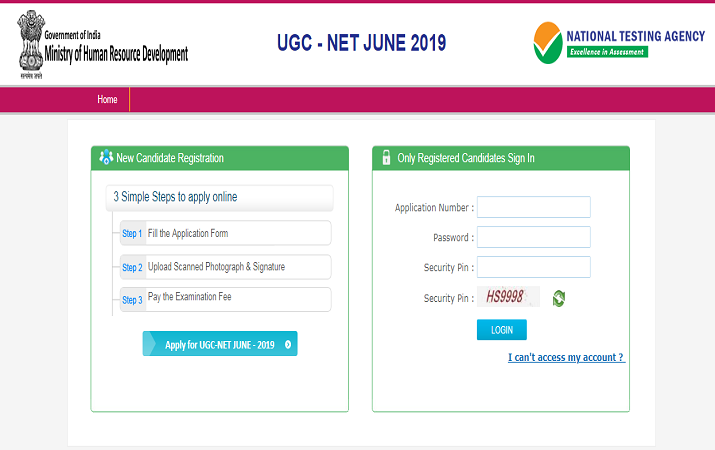Admit card for UGC NET Exam 2019 will be released today by National Testing Agency (NTA).Due to inevitable reasons, the release of NTA NET Admit card which was scheduled on May 15 has been extended to May 27.
NTA in a notice issued on May 15 informed the candidates about the delay in release of admit card. NTA will now release the admit card on May 27.
“The candidates are hereby informed that the downloading of Admit Card of UGC-NET June 2019 will take place from 27th May 2019. For more updates or latest news keep visiting the website of NTA UGC-NET: https://ntanet.nic.in” the notice read
The NTA will conduct the next UGC-NET for ‘Assistant Professor’ or for ‘Junior Research Fellowship and Assistant Professor’ from June 20 to 28, 2019. The result will be declared on July 15.
How to download NTA NET admit card 2019:
- Visit the official website of NTA NET at ntanet.nic.in
- Click on the link that reads Download NET 2019 admit card
- You will get a login page
- Key in your registration number and password and submit
- Your admit card will be displayed on screen
- Download and take its print out.
NTA NET 2019 syllabus
Candidates who are preparing for the exam should know that NTA has updated the syllabus of NTA NET exam.
Earlier, a notification issued by NTA read, The University Grants Commission has updated the syllabus of all NET subjects (including Paper-I on General Awareness). The updated syllabus of UGC-NET (Applicable for upcoming exams from June 2019 onwards) is available on UGC-NET website ugcnetonline.in.
Moreover, the syllabus of paper 1 of UGC-NET exam GENERAL PAPER ON TEACHING & RESEARCH APTITUDE has also been updated. This paper is common for all candidates and is compulsory for every candidate to qualify.
Read Article: Google, Intel: Offers MOOCs to upskill graduate
Objective of Paper 1 (teaching and research)
Unit-I Teaching Aptitude
- Teaching: Concept, Objectives, Levels of teaching (Memory, Understanding and Reflective), Characteristics and basic requirements.
- Learner’s characteristics: Characteristics of adolescent and adult learners (Academic, Social, Emotional and Cognitive), Individual differences.
- Factors affecting teaching related to: Teacher, Learner, Support material, Instructional facilities, Learning environment and Institution.
- Methods of teaching in Institutions of higher learning: Teacher centred vs. Learner centred methods; Off-line vs. On-line methods (Swayam, Swayamprabha, MOOCs etc.).
- Teaching Support System: Traditional, Modern and ICT based.
- Evaluation Systems: Elements and Types of evaluation, Evaluation in Choice Based Credit System in Higher education, Computer based testing, Innovations in evaluation systems.
Unit-II Research Aptitude
- Research: Meaning, Types, and Characteristics, Positivism and Postpositivistic approach to research.
- Methods of Research: Experimental, Descriptive, Historical, Qualitative and Quantitative methods.
- Steps of Research.
- Thesis and Article writing: Format and styles of referencing.
- Application of ICT in research.
- Research ethics.
Unit-III Comprehension
- A passage of text be given. Questions be asked from the passage to be answered.
Unit-IV Communication
- Communication: Meaning, types and characteristics of communication.
- Effective communication: Verbal and Non-verbal, Inter-Cultural and group communications, Classroom communication.
- Barriers to effective communication.
- Mass-Media and Society.
Unit-V Mathematical Reasoning and Aptitude
- Types of reasoning.
- Number series, Letter series, Codes and Relationships.
- Mathematical Aptitude (Fraction, Time & Distance, Ratio, Proportion and
- Percentage, Profit and Loss, Interest and Discounting, Averages etc
Unit-VI Logical Reasoning
- Understanding the structure of arguments: argument forms, structure of categorical propositions, Mood and Figure, Formal and Informal fallacies, Uses of language, Connotations and denotations of terms, Classical square of opposition.
- Evaluating and distinguishing deductive and inductive reasoning.
- Analogies.
- Venn diagram: Simple and multiple use for establishing validity of arguments.
- Indian Logic: Means of knowledge.
- Pramanas: Pratyaksha (Perception), Anumana (Inference), Upamana (Comparison), Shabda (Verbal testimony), Arthapatti (Implication) and Anupalabddhi (Non-apprehension).
- Structure and kinds of Anumana (inference), Vyapti (invariable relation), Hetvabhasas (fallacies of inference).
Unit-VII Data Interpretation
- Sources, acquisition and classification of Data.
- Quantitative and Qualitative Data.
- Graphical representation (Bar-chart, Histograms, Pie-chart, Table-chart and Line-chart) and mapping of Data.
- Data Interpretation.
- Data and Governance.
Unit-VIII Information and Communication Technology (ICT)
- ICT: General abbreviations and terminology.
- Basics of Internet, Intranet, E-mail, Audio and Video-conferencing.
- Digital initiatives in higher education.
- ICT and Governance.
Unit-IX People, Development and Environment
- Development and environment: Millennium development and Sustainable development goals.
- Human and environment interaction: Anthropogenic activities and their impacts on environment.
- Environmental issues: Local, Regional and Global; Air pollution, Water pollution, Soil pollution, Noise pollution, Waste (solid, liquid, biomedical, hazardous, electronic), Climate change and its Socio-Economic and Political dimensions.
- Impacts of pollutants on human health.
- Natural and energy resources: Solar, Wind, Soil, Hydro, Geothermal, Biomass, Nuclear and Forests.
- Natural hazards and disasters: Mitigation strategies.
- Environmental Protection Act (1986), National Action Plan on Climate Change, International agreements/efforts -Montreal Protocol, Rio Summit, Convention on Biodiversity, Kyoto Protocol, Paris Agreement, International Solar Alliance.
Unit-X Higher Education System
- Institutions of higher learning and education in ancient India.
- Evolution of higher learning and research in Post Independence India.
- Oriental, Conventional and Non-conventional learning programmes in India.
- Professional, Technical and Skill Based education.
- Value education and environmental education.
- Policies, Governance, and Administration
Courtesy: hindustan times
Download uLektz Apps for Latest Educational News /Events/Scholarships
Follow us: #facebook #twitter #linkedin also enroll our skill course








